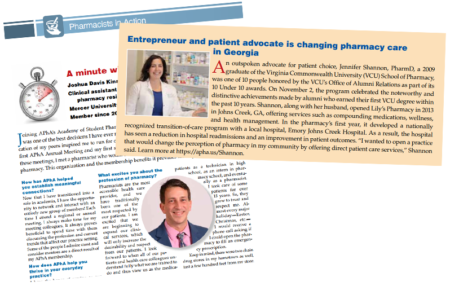Your blood and norovirus, new certifications for techs, Americans doubting vaccines, and more
15 Jan 2020
Posted by Andrew Kantor
APhA recognizes two of our own
Two GPhA volunteer members were featured in the the December issue of Pharmacy Today.
Josh Kinsey (clinical assistant professor at Mercer’s College of Pharmacy) was the focus of the “Pharmacists in Action” column, while Jennifer Shannon (owner of Lily’s Pharmacy in Johns Creek) was noted for her being named one of 10 people honored by Virginia Commonwealth University’s as a “10 Under 10” — for “distinctive achievements made by alumni who earned their first VCU degree within the past 10 years.”
Congrats to both of you!

Learn the alternatives to opioids
Are you frustrated hearing about the opioid crisis? Then help end it!
GPhA is offering a new course in 2020: Opioid Stewardship 101: Optimizing Non-Opioid Analgesic Therapy. It teaches the ins and outs of using non-opioids to treat both acute and chronic pain — which medications are best for which kinds of pain and how best to deliver them, and it’s taught by Danny Basri of WellStar Kennestone.
The course is one hour long, ACPE-approved, and it’s part of our growing catalog of CPE webinars — it also meets an education requirement for the Georgia Pharmacy Foundation Champions of Opioid Safety program. Check it out, yo!
Thursday, January 30, 2020 7:00 – 8:00 p.m. (from your favorite Internet connection).
Just $20 for GPhA members ($50 for non-members).
PTCB has new requirements for techs
If you want to become a PTCB-certified pharmacy tech, the organization has some new rules.
New requirements: Aspiring CPhTs must complete a PTCB-recognized education/training program or have equivalent work experience before they take the exam (i.e., “at least 500 work hours and fulfill certain knowledge requirements”).
The certification exam (and training) is different now: Instead of the previous exam’s nine knowledge domains, “the new PTCE categorizes knowledge into four domains: medications, federal requirements, patient safety and quality assurance, and order entry and processing.”
The renewal process has not changed.
Existing techs will have five more-advanced certificate programs to choose from this year: Technician Product Verification, Medication History, Hazardous Drug Management, Controlled Substance Diversion Prevention, and Billing and Reimbursement*.
And active CPhTs “will be eligible to earn an Advanced CPhT Certification in the future.”
* Coming soon!
Blood type and norovirus
Ah yes, norovirus — every parent’s favorite gift from the Petri dish that is a school building. Here’s a fun tidbit to share: It turns out that your blood type may determine how likely you are to catch it.
The explain-like-I’m-five version: Norovirus enters from the small intestine, using molecules called oligosaccharides to hitch a ride. It can only use certain oligosaccharides, though, and the ones in your intestine are the same ones on your red blood cells — and those are determined by your blood type.
The bad news: It’s only people with blood type B who are likely to fend off the virus. Still, good watercooler talk, right?
Vaccine misinformation continues to cling
A new Gallup poll finds only 84% of Americans think vaccinating children is important — that’s down from 94% in 2001. A good bit of news is that the number hasn’t gone down since 2015, but that’s still 16% of people who need more education.
There are some surprising breakdowns in the report of who believes in vaccinations and who doesn’t — by gender, education, political party, and whether or not they have children. Check it out.
Choose the food, choose the phages
The importance of the gut microbiome is pretty clear these days, but knowing that and doing something are two different things. San Diego State University researchers looked at how different foods affect the gut.
What they found is that the foods we eat don’t necessarily kill bacteria — rather, they trigger the spread of particular bacteriophages that then prey on certain pathogens.
Change the food, change the phages, change what’s in the gut.
“We could actually tackle certain conditions by adjusting the foods we consume, that will affect microbial diversity which in turn will influence health and diseases.
“We also found some foods acted as phage inhibitors and could be used to control pathogenic viruses.”


